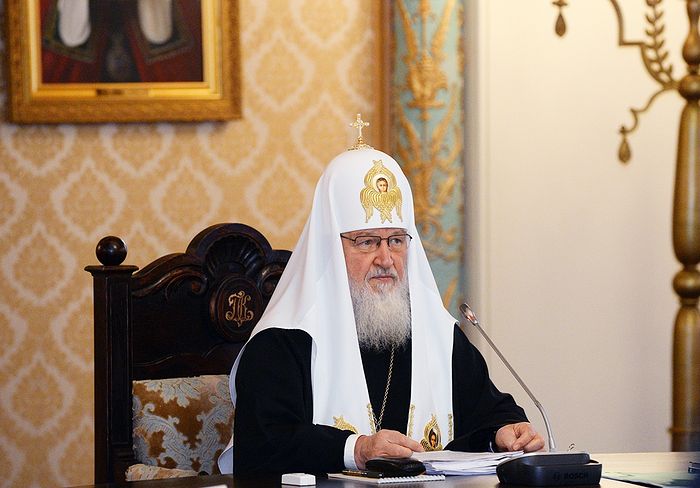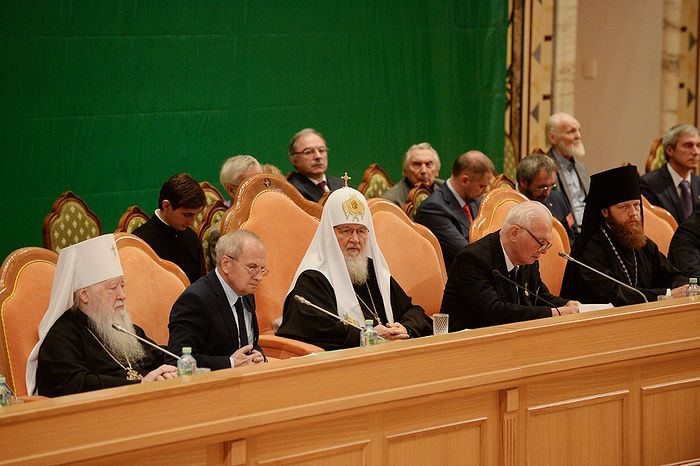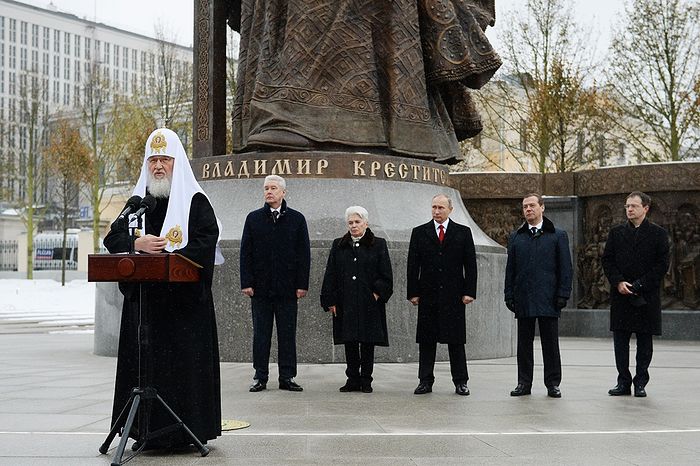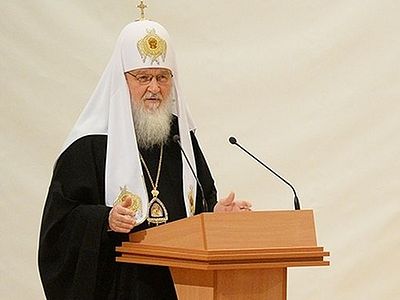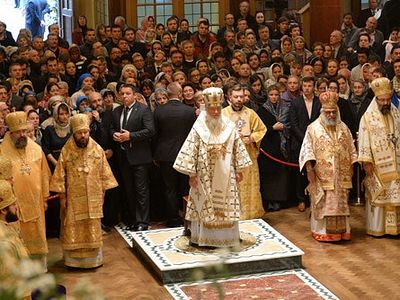Contact with real life
From very early childhood children become accustomed to gadgets and, beyond a doubt, this contributes to their rapid development. But there is a problem: they tend to plunge into virtual reality. We should introduce new elements into our Sunday school curricula that would help children get in contact with real life. That is why I consider it important to develop activities that would foster the love of labor in children.
Practical liturgical activities
Notice that children partake in Church services with great joy. It is one thing when a child just stands and contemplates what is going on at the service, but it is another thing when he is in the altar, on the kliros (choir stand), by the candle stands, at the memorial table, and somehow helps during the service. We should think over very carefully ways to involve children in the practical liturgical activities.
From his speech at a meeting of the Supreme Church
Council
October 31, 2016
On the blind transference of alien world views to the Russian environment
At the same time it should be remembered that the blind transference of alien world views and political models to the Russian environment without regard for national identity and the spiritual and cultural context, in many cases (or, to be more exact, nearly always) led to serious disturbances and even tragedies, as it was in our country at the beginning and at the end of the twentieth century.
A deep identity crisis
Another important point that we need to consider is the deep identity crisis that has gripped Western societies. A contradiction of a spiritual nature underlies this crisis: on the one hand, there are globalist tendencies in society, and the ideas of secularism and utilitarianism are being promoted; and on the other hand, all of this encounters resistance from their national, cultural traditions having a Christian history and Christian spiritual roots.
We believe that today the problem of the inhuman treatment of unborn children should not be removed from the agenda. This entails mass abortions, destruction of the family institution, the erosion of the fundamental moral values, and the aggressive attack on traditional religious cultures, which is especially expressed in the policy of a massive and deliberate de-Christianization.
The undermining of peoples’ moral foundation that we are witnessing now may lead to the dehumanization of the world. It is no coincidence that futurologists now raise the “post-human” theme more often, while “transhumanism”—a concept of nearly overcoming human nature and the appearance of a new class of rational beings—is becoming more and more popular.
Interference in the sphere of religious feelings
We must admit that interference in sensitive spheres (the discussion of which was formerly taboo), including the sphere of religious feelings, complicates the mutual understanding of a portion of the European and American elites not only with Russia but also with other world cultures, based on the traditional religious ethics—first of all with the Muslim world. The massive flood of information in many ways provokes the growth of Muslim extremism, which justifies its actions by the aggressive policy of secularism and the spiritual unscrupulousness of antagonistic (in their view) Western society.
From his report at the opening of the XX World Russian
People’s Council,
November 1, 2016
Development of Russian language and culture is necessary for our identity
A language is not only a means of communication but also a means of transmitting traditions, and a factor that forms a spiritual culture. So the role of the Russian language is pivotal in the formation and preservation of the Russian world as well. Development of Russian language and culture is vital for maintaining our identity, which is particularly relevant in the context of the modern globalization process.
From the report at the X Russian World Assembly,
November 3, 2016
The quasi-religion of modern times
Today we live in a world where the truths are being watered down. While we are often unconscious of this, many of us are adherents of the cult called “relativity of truth”. That is the quasi-religion of modern times: anything has a right to exist because in fact there is no unshakeable and eternal truth. If Prince Vladimir had shared the same ideas with some of our contemporaries, he would never have made his choice. He would then have remained a pagan or become a Christian just on a personal level and would have not baptized Russia (Rus’). Then there would have been neither Rus’, nor Russia, nor the Russian Orthodox state, nor the great Russian Empire, nor modern Russia.
Vladimir sought neither for spectacular Church services nor for peace of mind—the things that one can often find in a religion. He sought for the genuine Truth, which he finally found, and came to love the image of Christ; and in Holy Baptism he came to know that Christ is “the way, the truth, and the life” (Jn 14:6).
Loss of spiritual identity brings a country to its doom
Economic and political problems exist in any society. But loss of spiritual identity means the downfall of any country. Such a country is doomed, however powerful it may seem. That is why for Prince Vladimir, choosing the faith meant choosing the destiny for the people he loved.
If St. Vladimir had had no personal experience of love for Christ and had been guided exclusively by political or other motives, the people would have never believed him. The Holy Prince was neither a state-monger nor a sly person nor a hypocrite. He always was consistent and sincere—both when he was in error and sinned and when he found the genuine truth in the Orthodox faith, and became a saint.
The worst tragedy of modern times is lack of love
A Christian is a person who follows Christ at any time, not only when it is “comfortable” and “convenient” for him. The heart of any true follower of Christ aches not only for his relatives, but also for his town, for his country and the whole world. The most tragic disaster of our days is by no means the economic and political crises; the worst disaster is the acute and chronic lack of love: love for each other, for God and for the entire world created by Him.
The attainment of the truth forever
None of us can reconsider the choice of Prince Vladimir without destroying his own civilizational identity. To say that Equal-to-the-Apostles Prince Vladimir did something wrong means falling asleep under the cathedral canopy and waking up in the forest by a fire, without the ability to read and write. Unfortunately, this choice is made by those people who want to return to the jungle of pagan ignorance and to exchange the light of Truth for the darkness of the pre-Christian life.
The Holy Prince was popularly known as “St. Vladimir the Beautiful Sun”—such a tender name is given only to someone who is held in very deep affection. He was not afraid to change the direction of social development drastically because he loved his people, and believed that he would be understood and followed. He did not try to estimate all possible risks and hazards of this change of faith because for him it was not a tactical or strategic decision but the attainment of the truth forever—for himself and his people. And the truth cannot be accepted out of one’s own self-interest—otherwise it is no longer the truth. This resolution, his zeal for Christ and consistency in following the Gospel made Vladimir similar to the apostles, although there were 1000 years between them.
If we think that today we have nothing to choose, unlike St. Vladimir at his age, then we are badly mistaken. Perhaps our choice is not so noticeable, yet its effects are no less serious. Every day we choose what and who we live for, what things fill our life. That is, the choice of faith and the destiny of each individual person, and of the whole world, depends on this choice.
The monument to Prince Vladimir is a symbol of unity
The monument to Prince Vladimir is a symbol of unity of all the peoples whose father he is. And these are the peoples of historical Rus’ who now reside in many different countries. A monument to a father can be put up in any place where his children live—there is no contradiction here. But it is bad when children forget that they have one father.
From his address during the unveiling the monument to
the Holy Equal-to-the-Apostles Prince Vladimir in
Borovitskaya Square, Moscow,
November 4, 2016.
